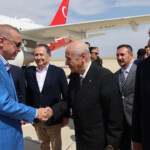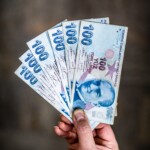‘Central to the AKP’s approach, according to the German federal agency, is the perpetual highlighting of alleged or actual cases of racism, Islamophobia and hostility towards Turkey in German society and the German state through a variety of channels‘
Germany’s agriculture minister, Cem Özdemir, was in no mood for celebrating. He expressed his disappointment in the wake of Turkish President Recep Tayyip Erdogan’s election victory and called on the German government to rethink its policy on Turkey.
“We have seen from our dealings with Putin what happens when you talk yourself into a corner,” commented the Green politician with Turkish roots. At the same time, he warned of an increase in Turkish nationalism and fundamentalism in Germany.
Özdemir also lambasted German Turks who celebrated Erdogan’s victory long and loud on the streets of Germany’s cities. “They are honking their horns because someone who turned their country into little more than an open prison has won an election, while at the same time enjoying the benefits of liberal democracy here,” the minister criticised.
Gökay Sofuoğlu, chairman of the Turkish Community in Germany (TGD), warned against the blanket bashing of Turkish voters in Germany. In an interview with Deutsche Welle, he said that around three million Turks live in Germany. Of these, some 500,000 had voted for Erdogan. Compared with the total number of German Turks, that is only about 17 percent.
Kemal Bozay, professor at the Centre for Radicalization Research and Prevention at the International University of Applied Sciences in Cologne, disagreed. He pointed out that more than 65 percent of those eligible to vote in Turkey’s presidential and parliamentary elections voted for Erdoğan and his People’s Alliance.
Bozay added that a section of the electorate had also voted for Turkey’s ultra-nationalist MHP party in the same parliamentary elections. The MHP is one of Erdoğan’s key allies. According to Germany’s Federal Office for the Protection of the Constitution (BfV), it is the umbrella organisation for the right-wing nationalist Grey Wolves.
The fact that people of Turkish origin are increasingly being influenced by conservative nationalist and extreme religious viewpoints should not be ignored, Bozay continued.
In his opinion, various organisations – such as the Union of International Democrats (UID), a lobby organisation of the Turkish ruling party AKP, the Turkish-Islamic Union of the Institute for Religion (DITIB), the Islamic Community Milli Görüş (IGMG) and the Federation of Turkish Democratic Idealist Associations (ADÜTDF), which is seen as a “Grey Wolves group” – are helping cement this trend.
The UID was founded in Cologne in 2004 as a lobby organisation for the Turkish ruling party AKP. It has since become the largest pro-government interest group that intensively promotes Erdoğan’s political agenda and tries to influence the opinion of the Turkish diaspora. Its headquarters are in Cologne, and according to the German Federal Office for the Protection of the Constitution, it has 15 regional associations nationwide, each of which has several local branches.
The idea that such umbrella organisations serve as a basis for AKP election campaigns is not really a problem, says Bozay. What he finds problematic is when such campaigns are used to spread extreme right-wing, ultra-nationalist and extreme religious positions and propagate anti-democratic attitudes.
Numbering approximately one million people, Germany’s largest Turkish community is in North Rhine-Westphalia. According to the State Office for the Protection of the Constitution, this community offers considerable mobilisation and voter potential. Turkey’s policies relating to its diaspora, aimed at undermining Turkish integration in Germany, take this into account.
Central to the AKP’s approach, according to the German federal agency, is the perpetual highlighting of alleged or actual cases of racism, Islamophobia and hostility towards Turkey in German society and the German state through a variety of channels. At the same time, the Turkish government emphasises how important the diaspora is to Turkey, and how much it is appreciated. The above-mentioned organisations disseminate the Turkish government’s narrative, in an attempt to reach the Turkish community and bind its members closer to Turkey.
A look at the UID’s social media channels provides plenty of examples. In one video recorded in front of Erdogan’s presidential palace in Ankara, UID chairman Koksal Kus is seen giving a speech to a large group of people who have apparently flown in from abroad. In Europe, it is not easy to be AKP and Erdogan supporters, says Kus. “Nevertheless, you have shown that you are Erdogan’s proud soldiers.”
Applause and shouts of ‘God is great!’ accompany the euphoria. He goes on, “In both ballots, you did an outstanding job. We have penned this heroic epic together.” The group then marches towards the palace entrance. One sets the pace. “Whose side are the diaspora Turks on?” another shouts loudly. “On the side of the leader!” the answer echoes back.
According to its own information, the UID conducted the election campaign together with the AKP Coordination Centre for Foreign Elections. Over the past year, they claim to have jointly formed 750 representations in 180 regions worldwide, mobilised 15,000 election workers and more than 30,000 volunteers for the campaign.
Photos reveal that they made home visits, distributed leaflets and gifts, and even organised transport to polling stations. UID representatives also paid visits to the polling stations. On election night, they looked over the shoulders of election workers during the count in Ankara.
A Germany-based election worker for the Turkish opposition says she found these visits by numerous UID representatives extremely unpleasant and felt they were attempting to intimidate her.
Since voting rights were introduced for Turks living abroad, mosque associations have also frequently come in for criticism. They are accused of campaigning for the Turkish government. This time, the focus is on DITIB and the Islamic Community Milli Gorus (IGMG).
DITIB, the largest Muslim umbrella organisation, has rejected the accusations. The organisation does not sanction election campaign events and advertisements for political parties within its congregations. DITIB has no influence, however, if the parties indicate the entrance of DITIB facilities as a meeting point for shuttle services to bring voters to polling stations.
DITIB refused to comment on the government propaganda spread by some imams. Prior to the elections, a number of imams claimed that foreign powers were seeking to divide up Turkey. The time had come to fight for religion, the religious authority and the Turkish flag.
Almost all the imams appointed in Turkish mosques in Germany are sent from Ankara. They are Turkish civil servants on the payroll of the religious authority Diyanet. Diyanet reports directly to President Erdogan.
German minister Cem Ozdemir fears that the next generation of imams to be sent to Germany could be even more nationalistic and fundamentalist. After all, Erdogan has expanded his alliance to include other nationalist, Islamist and anti-Semitic allies.
Extremism researcher Bozay shares this concern. “Here in Germany, in particular, we need an active policy of participation that involves young people of Turkish ethnicity and integrates them into the fabric of society,” he says. At the same time, it is important that extreme right-wing, Islamist and anti-Semitic Turkish organisations are excluded from democratic processes taking place in Germany.
This will only be possible, however, if the German government pursues an active policy of recognition that involves young people from an early age, Bozay concluded.
This article was originally published by Qantara.
The views and opinions expressed above are the author’s and do not reflect those of the Free Turkish Press.


